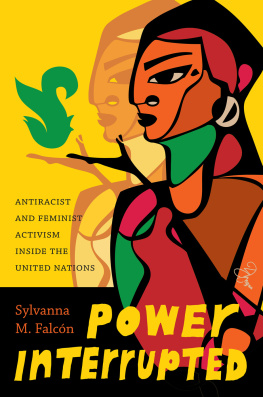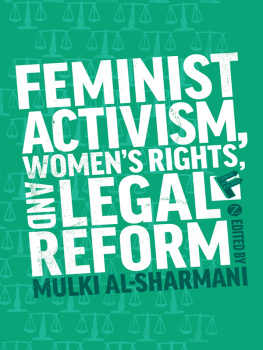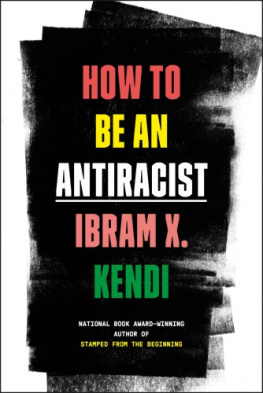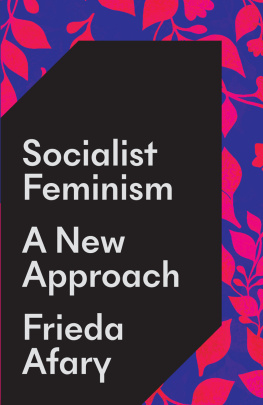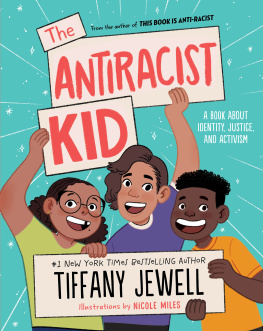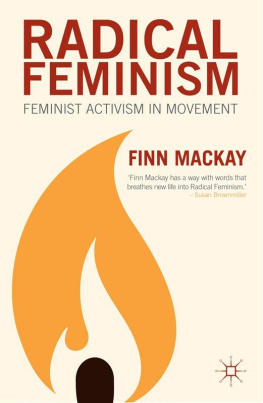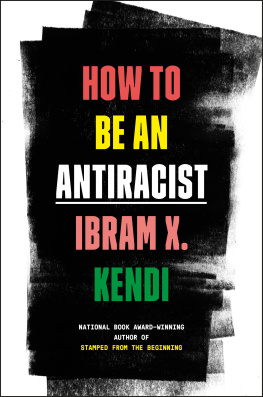Power Interrupted was supported by grants from the Division of Social Sciences, the Latin American and Latino Studies Department, and the Chicano Latino Research Center at the University of California, Santa Cruz.
Material from first appeared in Journal of Womens History 24, no. 4 (2012): 99120, and is reprinted with permission from Johns Hopkins University Press, copyright 2012.
2016 by the University of Washington Press
Printed and bound in the United States of America
20 19 18 17 16 5 4 3 2 1
All rights reserved. No part of this publication may be reproduced or transmitted in any form or by any means, electronic or mechanical, including photocopy, recording, or any information storage or retrieval system, without permission in writing from the publisher.
UNIVERSITY OF WASHINGTON PRESS
www.washington.edu/uwpress
Cataloging information is on file with the Library of Congress
ISBN 978-0-295-99525-0
The paper used in this publication is acid-free and meets the minimum requirements of American National Standard for Information SciencesPermanence of Paper for Printed Library Materials, ANSI Z39.481984.
To Aracely, the love of my life,
To Matt, for his love, support, and many years of happiness,
To my parents, Edgardo and Silvia, for giving me a blessed life, and
To the women in this book who fight for justice,
even when the odds seem against them
Para Aracely, el amor de mi vida,
Para Matt, por su amor, apoyo, y muchos aos de alegra,
A mis padres, Edgardo y Silvia, por darme una vida bendecida, y
Para las mujeres en este libro que luchan por la justicia,
aun cuando las probabilidades parecen en contra de ellas
ACKNOWLEDGMENTS
When I was an undergraduate at Santa Clara University, I confided in a small group of close friends that I wanted to be a writer. I wanted to write a book that had a political purpose. Given the supportive nature of my dear college friends, they purchased a book for me titled Writers Dreaming: 26 Writers Talk about Their Dreams and the Creative Process (1994) as a Christmas gift my senior year so that I could be inspired to make this goal a reality some day. I have never forgotten this kind gesture, and, nearly twenty years later, my goal has finally been realized.
Writing a book is difficult and, at times, even painful, but thanks to the support of the wonderful family, friends, and colleagues I would like to acknowledge here, I came out on the other end. I sincerely apologize if I have forgotten anyone who has been on this journey with me. I must first begin with my life partner and husband, Matthew Lehman. To him, I owe much. He prepared home-cooked meals for months on end without a single complaint, kept our house in order during what felt like never-ending workdays, and managed my moodiness when I struggled with my writing or with the stress of the job. I cannot put into words what his love and support mean to me; he has been by my side since our youth, and there is no one in the world I would rather take lifes journeys with than him. Our daughter, Aracely, has brought us so much joy. I am so honored to be her mom. She is my dream come true, and I thank her for being such an awesome and loving daughter. With this book now complete, I have to keep my promise to her about writing a book (just for her) that involves her deep love of cats.
I would like to also thank other members of my immediate family for their support. In particular I would like to recognize my parents, Edgardo and Silvia Falcn. My parents migrated to this country from Peru in May 1966 and, like all immigrants, had high hopes and big dreams for the future. With only four hundred dollars in their wallets (which ran out after one month, so my aunt sent them forty dollars to help the following month), no family in the United States, and lacking English fluency, they left all that was familiar to them to see if they could find more opportunities in the United States at a time when the country was in the throes of racial segregation and conflict. But my dad had a medical degree at a time when the United States was actively recruiting doctors for rural parts of the country, even if they came from the Third World. My parents first arrived in the US heartlandWichita, Kansasand eventually made their way to California in 1977. After several years of sheer determination and some good fortune as well, they were able to establish a financially secure life in the United States, of which my two brothers and I were the beneficiaries. I thank them for their sacrifices and hard work, and for giving me a very blessed life.
Next I have to acknowledge my remarkable feminist writing groupDana Collins, Molly Talcott, and Sharmila Lodhia. I appreciate their profound love and support, as well as their honest and generous feedback on my writing. They have read versions of this book multiple times and offered me the words of encouragement I needed to complete the project. They are truly inspiring women.
I would also like to thank my wonderful academic advisorsAvery Gordon, Denise Segura, and Beth Schneider from the University of California, Santa Barbara, and Chandra Talpade Mohanty from Syracuse University. All were encouraging throughout the completion of my research and in my eventual transition to an academic position at the University of California, Santa Cruz (UCSC). I never lost sight of the fact that I was lucky enough to go through graduate school having these women as my mentors. More importantly, their generous mentorship did not cease when I graduated. I am deeply grateful to Avery for providing me with invaluable academic advice whenever I asked for it, even when she was in Europe. Denise and Beth have always been thoughtful of including me when it comes to new professional opportunities and have provided good advice, delightful conversations, and much laughter when I see them at conferences. Chandra has been nothing short of amazing in her warmth, generosity, and counsel when I have sought it. I thank them all profoundly.
I would like to acknowledge my department colleagues from Latin American and Latino Studies, who have provided me with a rich and provocative intellectual home. My warmest appreciation and thanks to Rosa-Linda Fregoso for being my mentor and collaborator, as well as Patricia Zavella for graciously welcoming me to the department in fall 2010. I would also like to thank other UCSC colleagues who have helped in my transition to campus, especially Dean Mathiowetz, Kimberly Lau, Deb Gould, Herman Gray, Kent Eaton, Miriam Greenberg, Steve McKay, Shelly Grabe, Marcia Ochoa, Felicity Amaya Schaeffer, Alessandra lvares, Marianna Santana, and Dana Rohlf. Working at UCSC has been a pleasure because of the wonderful people mentioned here.
Other dear friends and supporters include the following, in no particular order of affection: Leisy Abrego, Carlos Alamo Pastrana, Hillary Haldane, Karl Bryant, Margaret Huang, Krishanti Dharmaraj, Khanum Shaikh, Shannon Gleeson, David Hernndez, Sekou Franklin, Lorena Garcia, Michelle Jacob, Jennifer Nash, Bandana Purkayastha, Liz Philipose, Ejim Dike, Lisa Crooms, Tiffany Willoughby-Herard, Jeanne Scheper, and the brilliant community of scholars affiliated with the Future of Minority Studies program. Leisy Abrego has been a reliable and trusted friend; she provides the ideal balance of being a compassionate listener and offering just the right words of encouragement when things become difficult. Even though Carlos Alamo Pastrana lives on the opposite coast, he remains a loyal friend who always has my back. Bandana Purkayastha became my mentor as part of the Woodrow Wilson postdoctoral fellowship when I was in the midst of extensive manuscript revisions. She offered feedback at every stage of manuscript revisions, and I am truly grateful for her friendship and support.


